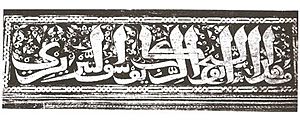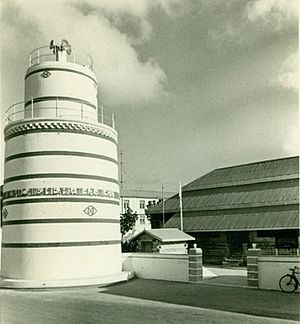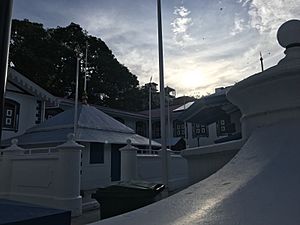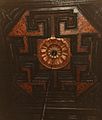Islam in Maldives facts for kids
Islam is the official religion of the Maldives. The country's 2008 Constitution, also known as "Fehi Gānoon", says that Islamic law (called Sharia) is very important. This constitution also states that to be a citizen of the Maldives, you must follow the state religion. This means all citizens are legally Muslim.
Contents
History of Islam in the Maldives
By the 1100s, Arab traders were very important in the Indian Ocean. This might help explain why the last Buddhist king of Maldives, Dhovemi, became a Muslim in 1153 (some records say 1193). After converting, the king took the Muslim title and name Sultan Muhammad al-Adil. This started a long line of 84 Islamic rulers (sultans and sultanas) that lasted until 1932.
The person usually given credit for bringing Islam to the Maldives is a Sunni Muslim visitor named Abu al-Barakat Yusuf al-Barbari. His respected tomb is now in Medhu Ziyaaraiy, across from the Malé Friday Mosque in the capital city of Malé. This mosque, built in 1656, is the oldest in the Maldives.
How Islam Came to the Islands
The Maghrebi/Berber Idea
The famous Moroccan traveler Ibn Battutah lived in the Maldives in the 1340s. He wrote that a Berber man from North Morocco, Abu Barakat Yusuf the Berber, was believed to have spread Islam there. Stories say he convinced the local king after defeating a sea monster called Ranna Maari.
Even though some later stories question this, it helps explain parts of Maldivian culture. For example, Arabic has historically been the main language for government, unlike Persian and Urdu used in nearby Muslim countries. Also, the Maliki school of Islamic law, common in North Africa, was the official one in the Maldives until the 1600s.
The Somali Idea
Some experts think Ibn Battuta might have misunderstood Maldivian writings. They suggest he might have favored the North African story of this Shaykh (a respected religious leader). This is even though an East African story was also known at the time. When Ibn Battutah visited one island, its governor was Abd Aziz Al Mogadishawi, who was Somali.
Another important Shaykh on the island during Ibn Battuta's visit was Shaykh Najib al Habashi Al Salih, another learned man from the Horn of Africa. His presence shows a strong Islamic influence from the Horn of Africa on the island.
Scholars have also suggested that Abu al-Barakat Yusuf al-Barbari might have lived in Berbera. This was a major trading port on the northwest coast of Somaliland. The ancestors of the Somalis were called Barbara or Barbaroi by medieval Arabs and ancient Greeks. Ibn Battuta also mentioned that the Sultan of Mogadishu at that time, 'Abu Bakr ibn Shaikh Omar', was a Berber (Somali).
The Persian Idea
Another idea, found in the Raadavalhi and Taarikh historical texts, is that Abu al-Barakat Yusuf al-Barbari was actually Abu al-Barakat Yusuf Shams ud-Din at-Tabrizi. He was also known locally as Tabrīzugefānu. In Arabic writing, the words al-Barbari and at-Tabrizi look very similar. This is because, in the past, some Arabic letters looked identical and were only told apart by the overall meaning of the word. (Now, dots are added above or below letters to make them clear.) So, "ٮوسڡ الٮٮرٮرى" could be read as "Yusuf at-Tabrizi" or "Yusuf al-Barbari".
Islamic Influence in Daily Life
Islam is the official religion of the Maldives. The constitution, updated in 2008, says that citizens must follow Islam. Article 9, Section D, and 10 state:
A non-Muslim may not become a citizen of the Maldives. The religion of the State of the Maldives is Islam. Islam shall be the one of the basis of all the laws of the Maldives. No law contrary to any tenet of Islam shall be enacted in the Maldives.
The traditional Islamic law code of sharia is the main set of laws in the Maldives. The President, attorney general, Ministry of Home Affairs, and the Majlis (parliament) interpret these laws to fit Maldivian life. Article 142 of the constitution says:
When deciding matters on which the Constitution or the law is silent, Judges must consider Islamic Shari’ah.
It is not allowed for non-Muslims to try to convert people in the Maldives. It is also illegal to publicly have or give out non-Muslim religious items, like the Bible. Public worship for religions other than Islam is forbidden.
On islands where people live, the mosque is the main place where Islam is practiced. Friday is a very important day for Muslims to go to the mosque. Because of this, shops and offices in towns close around 11 a.m. on Fridays, and the sermon starts by 12:35 p.m.
The adhan (prayer call) is made by the Mudhimu. Most shops and offices close for about fifteen minutes after each call to prayer. During Ramadan, which is the ninth month in the Muslim calendar, cafés and restaurants are closed during the day. Working hours are also shorter.
Mosques
Most inhabited islands in the Maldives have several mosques. Malé has more than thirty. Most traditional mosques are white buildings made of coral stone. They have roofs made of corrugated iron or thatch.
In Malé, the Islamic Centre and the Grand Friday Mosque are impressive and beautiful buildings. They were built in 1984 with money from countries like the Persian Gulf states, Pakistan, Brunei, and Malaysia. The mosque's gold-colored dome is the first thing you see when you get close to Malé. In mid-1991, the Maldives had a total of 724 mosques for men and 266 mosques for women.
-
Old Mosque of Malé, with white coral decorations.
-
Decorative Arabic writing on a wooden panel in Idu Miskit, Malé.
Important Events Related to Religion
In 2008, after a new constitution was approved, the Maldives started having a multi-party democracy.
The Maldivian religious party called the Adhaalath Party was started by religious scholars and activists. With new freedom of speech and more relaxed laws, different religious groups grew in the Maldives.
The government works to manage religious extremism. In every presidency, the Adhaalath Party has been part of the government. The Islamic Ministry and other important government roles are held by members of the Adhaalath Party. In the Maldives, there are general rules for clothing that follow democratic law. Extreme actions related to religion can lead to long jail sentences.
- 2007 Malé bombing: On September 29, 2007, a homemade device went off in Sultan's Park near the Islamic Centre in Malé. This incident caused injuries to 12 foreign visitors.
- 2011 Ismail Khilath Rasheed controversy: In February 2012, many old artifacts from before the 12th century at the Maldives National Museum were damaged during an attack. These items showed the country's history before Islam.
See also
 In Spanish: Islam en las Maldivas para niños
In Spanish: Islam en las Maldivas para niños
- Freedom of religion in Maldives
- Islam in South Asia
Images for kids
 | Chris Smalls |
 | Fred Hampton |
 | Ralph Abernathy |





















